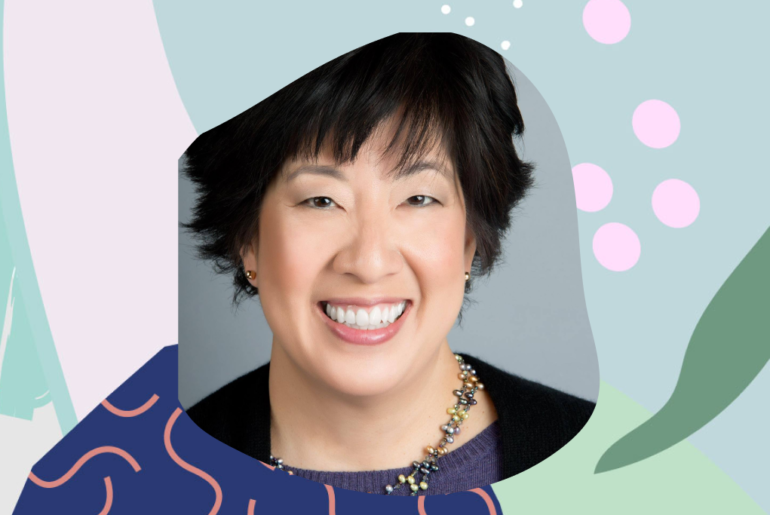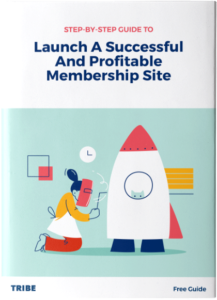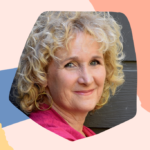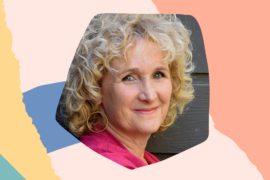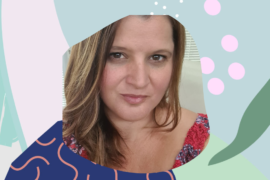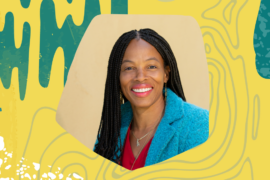Dr. Christine Li was an extraverted child who struggled to manage her time, and it left her constantly stressed. She took a job as a college admissions officer, discovered a love for psychology, and got her Ph.D. At her next job, she found herself tasked with designing a workshop about procrastination–something she needed more than anyone else.
Now, at Procrastination Coach, she helps her patients ditch their stresses, fears, and the feeling of being “stuck” for good. She teaches productivity, self-discipline, and the essential steps to live without procrastination and to live a life of purpose and confidence.
Today, Dr. Li joins the podcast to share her journey from procrastinator to procrastination coach, why there’s no single path to success (and why that’s okay), and the powerful ripple effect created when you help others unlock their potential.
Key Takeaways
- What’s actually happening when someone says they want to do something, but never do it.
- How memberships can help people unlock skills and potential–as well as provide their leaders with new information and knowledge.
- The unique healing process that can happen within memberships.
Free Give
FREE Guide – Launch & Grow a Profitable Membership Site
Ready to reclaim your time and attract more monthly paying customers? Our step-by-step guide will show you how to build a membership site that turns your passion into recurring profit. Click here to download!
Memorable Quote
- “I think when we walk into new opportunities, feeling excited, which is energy but then also adding to that our anxiety and fear, it just loads us up too much and gets us in the wrong state for creation.” – Dr. Christine Li
Episode Resources
- Procrastination Coach
- Freedom From Procrastination Membership Program
- Make Time for Success podcast
- 5-Minute Self-Discipline Exercises: Stay Motivated, Cultivate Good Habits, and Achieve Your Goals
Transcript
Read The Transcript
Shelli Varela: Dr. Christine Li, welcome to the It’s a TRIBE Thing Podcast. It is our absolute pleasure to have you. Thanks for joining
Dr. Christine Li: Thank you for having me, Shelli. I’m so honored to be here.
Shelli Varela: Can you please start with who you serve and what it is you do specifically?
Dr. Christine Li: I am a psychologist. I’ll start there, I’m in New York. During the pandemic, I’ve been working from home but typically I have an office in Manhattan and I work with individuals and couples. And online I am known as Procrastination Coach. So, for the past nine years, I’ve been serving people who identify or come close to identifying with the topic of being a procrastinator. And that is actually quite a broad group I found and I think you could see that is pretty true but I serve lawyers and students and engineers and retirees and people who find their way to me somehow over the Web. And it’s been a lot of fun. It’s been really educational for me. It’s been helpful for me in my own life to see the range of possibilities of how people procrastinate and also how people can really heal themselves and make the journey to health, wellbeing, and good time management.
Shelli Varela: I love it. I’m excited to share your story but I’m also excited to leach some incredible advice from you because procrastination and the root thereof is a personal fascination of mine so I’m super stoked. Can you share with us where did this come from? Before you were a psychologist, you had that moment where somewhere in your past you cartwheeled along your way and ended up where you are now. What did the root of that look like if we were to trace it all the way back?
Dr. Christine Li: I was less a cartwheeler and more a stumbler. I would say that I think people say they’re lifelong procrastinators. I would say I could identify as a lifelong procrastinator. I believe that my own issues stemmed from a lack of strong communication skills early on, a lack of knowing how to manage my time early on, and also just this desire to be involved in all the things. I’m very naturally extroverted, very curious about things, but that combination of things made it very difficult for me as a middle schooler and a high schooler and a college student to feel calm and to feel like I could do things well and safely and that things were actually going to fly. I oftentimes felt panicked. I oftentimes was lacking in sleep and breakfast food because I was always behind on something. I was always feeling like the other shoe was going to drop.
Shelli Varela: What a terrible way to live and be productive, actually.
Dr. Christine Li: I was fortunate to be born with a very optimistic and happy demeanor so that pulled me through. So, I wasn’t miserable but I was way more stressed than I needed to be in hindsight because if I had just known a few time management tips and if I had perhaps believed in myself a little bit more earlier on, my whole road would have been a lot easier.
Shelli Varela: You had talked previously about being a college student and then you went from college to an admin officer and you were sharing that one of the things about being an admin officer that inspired you was getting to hear the stories from the people. Can you talk to us about how that segued into psychology? And then from there being one of the most sought after people with respect to procrastination?
Dr. Christine Li: I had the good fortune of being an admissions officer after college, and so I was dispatched to the West Coast to meet young people who are interested in getting into college and interviewing them, hearing about their stories and their journeys. And then in that process, learning that I was pretty good at that, that it was fun for me and that, again, it was something that was just endlessly interesting because everyone has their own very individual stories. So, it was in that job and through that job that I realized this is a skill that I have and one that I could use perhaps professionally. And then I basically stumbled my way into some coursework in psychology. Again, I felt this seems to come easily to me. I really enjoy reading this material and let’s keep pursuing this. So, I applied to a master’s program and then to a doctoral program and then stumbled in there as well. As we were talking earlier, I feel like my life has been a bunch of very happy accidents and lucky accidents where I entered into a field that I knew nothing about really. I didn’t know that people spent years in therapy. I had never been in therapy myself. But then when I entered into this program, I felt like my classmates, my professors, they were speaking a language that I really understood, and that was fascinating to me.
And I think because I am Chinese-American and grew up really observing everything that was culturally Chinese and American and doing the double duty that I had kind of honed my skills of observation, so that fit into psychology as well. But even in graduate school, even at the doctor level, I was still relatively silent, relatively closed off, and still procrastinating. So, even that late in my life, I was still struggling with this issue and nobody was really recognizing that on my behalf because I hit it pretty well too. All my anxiety was just internal. I looked pretty put together on the outside. I would turn things in eventually but then it was my first job after my Ph.D. where someone needed someone to design a procrastination workshop. I shot my hand up to volunteer and then rolled into what was another happy accident that I realized, “Oh my goodness, I just volunteered for the one thing that I really need help with.”
Shelli Varela: How to solve a problem inadvertently.
Dr. Christine Li: Correct. I need this workshop more than anyone. But then, of course, I ended up studying it, researching it, designing a workshop, and now I’ve been teaching it for over ten years. And it’s been a pleasure because, of course, when you teach what you know, it’s like, “Why do people pay me for this?” It’s just such a pleasure to help people transition from being stuck and being overwhelmed and stressed and sad about their performance too quickly I would say to a point where they feel more empowered, stronger, smarter, clearer, and more able to act in their full power. And that really is like a drug for me. I really have believed that this is my mission and I’ve been very happy to be able to bring that online.
Shelli Varela: I am so excited to unpack this. So, I have a theory about procrastination if I may run it by you because I see so many people struggling in this way. I see both men and women but I’ll speak to women because they’re the demographic I deal with the most who are brilliant and amazing and smart and gifted and just so passionate. And they have this dream in many cases, it’s a business, coaches, authors, speakers, entrepreneurs, something they want to do. And the dream is almost like it seems like a carrot on a stick. And my perception of that is growing up in the world as a woman, there are so many obligations like manned or manpower, something’s grandfathered in, and all of those grains of sand in and of themselves inconsequential. But at some point when your body tells you, “Yes. Oh, I would like to do that thing,” all of these grains of sand in an instant come crashing down and you find yourself on a beach. What I find, though, is a lot of people will feel that, yes, in their bodies, they’re like, “Oh, I want to give a TED talk, start a membership site online,” whatever that looks like but they keep it conveniently just out of reach.
And so, it shows up looking like, “Well, I’m tired or I’m busy or I’m overwhelmed,” but I feel like what it actually is, which is what I’m excited to ask you about, what I feel like it actually is, is procrastination that is shrouded in fear or it’s the first time I’ve felt this excitement and this hope in a long time and if I try and I fail that I have to give it up or if I try it and I’m not good at it or if I try it and it doesn’t work, and then all my loved ones are saying, “Well, we told you, you shouldn’t have done that. You should have just whatever it is, stayed with the job you had instead of trying this new business.” What would you tell somebody who is in that situation with respect to procrastination and the root of it in finding that first domino so that they could get some leverage for a new decision?
Dr. Christine Li: Great question. And, of course, a very real scenario where we’re holding ourselves back from the thing that really excites us. I think it’s such a common thing if that happens especially to women, and really the first technique that I tend to use, even with clinical patients, is to figure out what is the fastest way to have people relax and I mean relax in the broad sense of the word where the entire anxiety system gets calmed down. Because on a day-to-day basis, I think anxiety tends to build just by the end of the day. There’s a reason why we feel spent is because we’ve had to make decisions, go through things, drive cars, dig ourselves out of snow sometimes. Whatever it is, it’s energy expended and anxiety that has been burned through. And I think when we walk into new opportunities, feeling excited, which is energy but then also adding to that our anxiety and fear, it just loads us up too much and gets us in the wrong state for creation. I think creation is something that’s very empowering and enlivening, and I think anxiety can be very deadening and heavy. And so, then we feel ambivalent all of a sudden. That’s what we in psychology speak, we call that a conflict where we have two different ideas about the same goal. So, after trying to calm people down, the next thing would be to say, “How do we get you to be singularly focused on the carrot, on the goal in front of you? You already know what excites you. What would it take for you to go grab that without hesitation, with ease, with direct, powerful, purposeful action?” And typically, the subject in question knows what the answers are. It’s just the anxiety that is covering all of that up. And we’ve all been there. All of us have been there.
Shelli Varela: That’s brilliant. So, you have a membership site called Freedom from Procrastination. What is it that people are taking away from that? Let me ask a better question. What is it that the change they’re experiencing are able to accomplish as a result of being part of your community and having someone like you, who has studied it, who’s lived it, who understands it, and who’s created this amazing place for people to come and not only accomplish the things they want to do but also heal in a manner?
Dr. Christine Li: As you can imagine, there are multiple routes taken by members. So, it isn’t a singular success path that is in a singular path, and I think that’s fantastic. And the fact that people can blend and help each other inside a membership program is one of the most fantastic healing factors of being in a group, in general, is that it’s not just my experience and my personal stories and the tips that I share. It’s really the mere act of being in a group and being open and willing to share and willing to work. That is the healing process. Part of why procrastination is so toxic and destructive is because it causes us to shut down our desires to be with other people and to move forward. And really, who are we but beings who work and want to be social, even introverts. These are goals, right, to work and to play, and playing oftentimes involves other people. So, when people join my membership, they oftentimes are a little bit stunned because what do we do in a membership such as this one? But what happens quickly is I do a quick piece of coaching and then the second part of the hour, everybody gets off their video, turns on the mute button, and does what they have promised to do inside that short period of time. And that serves multiple purposes. It teaches people how to be intentional with their time use, it teaches them how quickly time passes, and it also teaches them how excited they can be when they match their intention with their action.
And it happens every time I get on a call with these members, it’s enlivening to absolutely everyone, including myself. And over the years, I’ve come to feel like these members are my family members because we’ve gone through so much together. It’s light though. I don’t mean to say that we’ve gone through heavy things. We’ve gone through a lot of wins and journeys and successes, career change, people have moved homes, people have built businesses. So, when your skills are unlocked, then your potential is also unlocked, and that’s where the energy is just exploding all around. And so, I think the membership is a great hub for people to feel safe, to feel like they can experiment, to feel like they have people who get them, also another powerful thing about the membership model, and I’m very grateful that I started this membership because it’s a really nice place for me to get information, for me to try things out, for me to help people, and for people to know me as well.
Shelli Varela: What’s the most rewarding thing about the membership for your life and your business?
Dr. Christine Li: My most rewarding thing has to be that I help people to feel well. It really is the same as with psychology. There’s nothing better for me. I once thought, “Oh, I should be an acupuncturist because I had gone to acupuncture and it helped me from physical pain.” I think if I were not helping people with their emotional pain, I’d probably be some sort of medical doctor because I think bringing relief to people is fun. It’s really fun.
Shelli Varela: And it’s the biggest gift you can give also, I feel.
Dr. Christine Li: Yes, I do, too.
Shelli Varela: We so appreciate you coming in, first of all, doing the work you’re doing because unlocking people’s potential means they get to go out and give their gifts to the world, and the ripple effect of that is beyond measure. So, I know that you have a book and a podcast as well. If people are looking for you online, where is the best place they can find you on the Web, on Social, your book, and your podcast?
Dr. Christine Li: Okay. Thank you so much. I’ll start with the podcast because that’s the newest child of mine and quickly becoming my favorite child. It is called the Make Time for Success Podcast. It launched January of this year, 2021, and I interview guests. So far there have only been female guests but I have a feeling I’m going to have some men on there too. And we just talk about how to get past resistance and doubt and fear and pursue that personally important carrot. How do we get our life dreams fulfilled? So, that’s my purpose on the podcast. It’s been so much fun. The book is called 5-Minute Self-Discipline Exercises: Stay Motivated, Cultivate Good Habits, and Achieve Your Goals. And that was written during the pandemic in a quick five-week period. And it is a compilation of just the best tips that I know of the past 10 or 15 years, really about how to get past the stories that aren’t serving you so that you can actually put something out onto the page, into the world, whatever you need. And then where to reach me, I’m all over the Web, mostly on Instagram and Facebook as Procrastination Coach and my website is ProcrastinationCoach.com.
Shelli Varela: Amazing. Well, we appreciate all the work you’re doing in the world. Thank you so much for stopping by and sharing your personal story. And we’re so grateful you were here.
Dr. Christine Li: Thanks for being such a lovely interviewer and for having me on. Good luck to everyone who is thinking about a membership or thinking about pursuing your dream. You have got this. Just stay with it.
[END]
To learn more and get access to all episodes, visit our podcast page!
